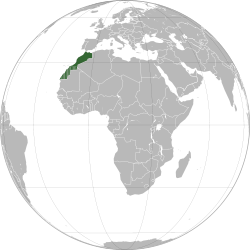By: Said Temsamani
 Nobody denies Morocco’s efforts over decades, and that is still unfolding, for the sake of reaching a final solution to the Sahara issue. One problem is a real drag on the entire area of North Africa and also obstruct the necessary dynamics of cooperation that must exisit between Maghreb countries.
Nobody denies Morocco’s efforts over decades, and that is still unfolding, for the sake of reaching a final solution to the Sahara issue. One problem is a real drag on the entire area of North Africa and also obstruct the necessary dynamics of cooperation that must exisit between Maghreb countries.
The will shown by Morocco to resolve this conflict in a peaceful, objective and without recourse to babble, taking into consideration the interests of all parties as provided by international law, and without violating therefore the Moroccan territorial unity, has engendered a renewed dynamic. However, the direct adversary, the Polisario backed by Algerian regime, has remained stuck to the same position as always, ready at all times to “kill” any attempt to resolve once and for all this issue.
In this context, we note that the decision made by the King of Morocco to grant autonomy to the southern provinces was not an easy decision nor a diplomatic maneuver. It was rather a brave decision which aims to crystallize a new performance with a view to find a solution to the problem from a bold vision, other than those previously developed, which revolutionizes the entire Moroccan administrative apparatus, always characterized by centralism. But today, the autonomy plan, will give powers to local elected officials and different regional. Long ago it was almost inconceivable that anyone would think, even remotely, that this new territorial model will be proposed and now ready to be implemented.
The principles governing the Autonomy Plan guarantees the rights of Sahrawis. Principle of participation and equality that is outlined in section 4, under which Morocco guarantees to all Sahrawis, whether inside the country or abroad, “without discrimination or exclusion, the place and the role within the organs and bodies of the region “, and this based on a democratic and free elections, as stipulated in paragraph 5, which states that” all Sahrawi populations involved, democratically, in the management of their own affairs through legislative, executive and judicial (…) and participating, actively, in the economic, social and cultural development of the Kingdom. ” Those powers, pursuant to Part 12 – be exercised particularly in the domains:
– “Local administration, local police and the jurisdictions of the region.
– Economic development, regional planning, encouragement of investment, trade, industry, tourism and agriculture.
– Management of budgets and taxation of the region.
– Infrastructure: water, hydraulic facilities, electricity, public works and transportation.
– Social: housing, education, health, employment, sports, security and social protection.
– Cultural: the promotion of the Saharan Hassani cultural heritage.
– Principle of consensus and consultation. In paragraph 8 states that “the Statute of Autonomy will undergo a referendum of the population concerned”, while paragraph 15 recognizes the right of this region to consult on issues that come up within the framework of Moroccan sovereignty. “State responsibility is mentioned in the same paragraph, the domain of Foreign Affairs shall be exercised in consultation with the Autonomous Region of the Sahara”. The Moroccan Plan has gone even further by making the Statute of Autonomy of the Sahara region “under negotiation and subject to a free referendum of the populations concerned (paragraph 27)”.
With all the generosity displayed in this project, Morocco has only asked the other party to take a single commitment, which is stipulated in section 13 whereby the Moroccan state assumes “the right to retain defense, foreign affairs and the constitutional and religious prerogatives of the King, the Commander of the Faithful “.
Would it not be preferable that negotiators concentrate more on these proposals to analyze, to discover their details in order to produce concrete actions likely to end once and for all this long conflict. A problem that continues to widen the wound and submerge whole area in a sea of nonsense? Are not these proposals consistent with the principles of good governance as is dictated by international law?
Now we understand why the international community has been unanimous in characterizing the Moroccan proposal as “realistic, applicable and accepted by all.” Indeed, the impact of this initiative will certainly redound to the benefit of the entire Maghreb region. One has to realize that the Maghreb has make a fresh start in relation to this problem and direct all efforts towards building a regional bloc capable of addressing the challenges that interest both this region and to all its citizens.

Said Temsamani is a Moroccan political observer and consultant, who follows events in his country and across North Africa. He is a Senior Fellow, Merdian International Center Washington DC, Founder and CEO “Public Initiatives” Consulting firm and Former Senior Political Advisor, US Embassy Rabat, Morocco.






